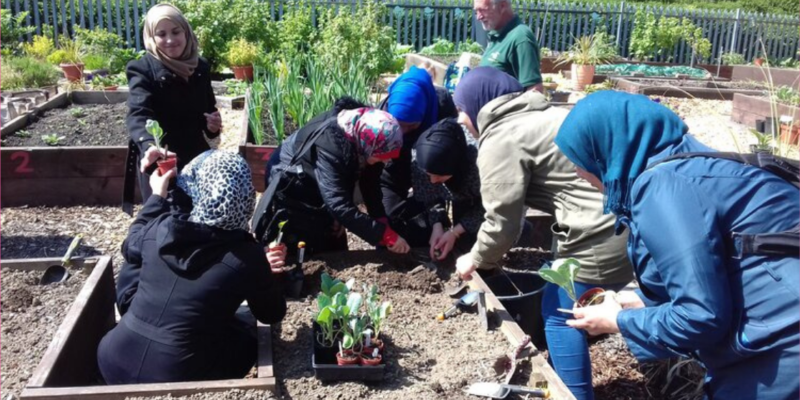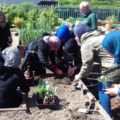
 Community responses to the pandemic were compassionate and inspiring – and highly practical. The Burghead community was one example – it was speedy, with local people and organisations forming a group to make sure everyone had access to food. Burghead quickly decided they wouldn’t means-test the need for support. They created a ‘Blessing Box’ of supplies in a discrete public space for anyone to use and take what they need. People commented on how kind, inclusive and without judgment this response was. They also offered hot meals – a vital point of connection for people feeling lonely and isolated. It’s the little things, isn’t it? The action was mostly led by older members of the community – showing how they are caring for and not simply cared for. Whether shielding, key workers, or community volunteers and activists, everyone’s caring actions made a difference.
Community responses to the pandemic were compassionate and inspiring – and highly practical. The Burghead community was one example – it was speedy, with local people and organisations forming a group to make sure everyone had access to food. Burghead quickly decided they wouldn’t means-test the need for support. They created a ‘Blessing Box’ of supplies in a discrete public space for anyone to use and take what they need. People commented on how kind, inclusive and without judgment this response was. They also offered hot meals – a vital point of connection for people feeling lonely and isolated. It’s the little things, isn’t it? The action was mostly led by older members of the community – showing how they are caring for and not simply cared for. Whether shielding, key workers, or community volunteers and activists, everyone’s caring actions made a difference.
Local action is having an impact beyond the pandemic, addressing wider health equality and development issues. Public transport is one issue older people in rural communities raise all the time. It affects so many spheres of life, and often feels insurmountably complex. But strides have been made in huge community transport development over the past year. For example, the Hopeman Community Bus had been underused – and tricky to book. The Lossiemouth GP surgery was hard to reach from smaller communities, especially for people who didn’t drive or felt unsafe taking buses during Covid. A diverse group got together, and quickly turned the idea of reforming the Bus Committee and sorting transport for patients to the surgery into reality – in 6 weeks it was working! Local knowledge and older community members’ leadership have been at the heart of the successes. As have the different organisations and decision-makers listening and following their lead.
Trusting partnerships
Some of the ‘blockages’ in our systems making it harder for people to learn from each other, co-produce and collaborate have clear solutions. We’ve been working with lots of people on how to create partnerships based on trust. A frequent reflection from the Community Solutions conversations was that people in the public and community sectors often don’t really understand each other’s circumstances – what they can contribute, and challenges they face. ‘Co-shadowing’ is one idea emerging from the conversations.
New collaborations, and funding which trusted communities to deliver support, made possible what was previously difficult. In-work poverty and fuel poverty are also being discussed and addressed in new ways. The Moray Climate Assembly is one new project shaping the path – getting going with ambition and energy to include everyone in addressing community needs. Different groups are speaking more – working together – and the energy to harness community resilience is tangible.
People living in rural communities have even more challenges accessing social care than people living in towns, so it’s not surprising that innovative approaches are developing rurally too. Community Solutions looked at the evidence and impact around community responses during Covid, and how they could shape social care in the future. People shared experiences around how responses and care systems shaped by local people can create more choices and build resilience. Co-produced models are also working well for people in equalities groups and different circumstances, by involving everyone’s expertise.
The LGBTIQ+ family group we support has been saying similar things. To improve access to care services and local supports, we co-created resources for service-providers. We’ve also been creating spaces – in-community and with others – to share learning around reproductive services and support, perinatal wellbeing, and other topics. There’s a huge amount of unique and valuable knowledge in every community – and many useful conversations to come.
Human Rights learning
Communities we work with have been finding Human Rights useful for discussing experiences and intersectional equalities issues. Instead of imagining rights abstractly, they come alive as day to day experiences in communities. Everyone benefits when unequal access and barriers to enjoying rights are identified. These issues tend to have a huge impact on people’s overall health, wellbeing, inclusion and access to services. Neighbourhood Networks members discussed rights, accessibility and mental health – and issues exacerbated in lockdown. We helped members share their learning through a community human rights charter and DIY animations. Moments of Freedom, a group we support led by New Scots women in Clydebank, have also been addressing wellbeing through human rights, mapping resources and gaps. They got involved in providing local Covid-19 information in community languages, and have been creating space to increase social inclusion – issues identified as key wellbeing barriers. The group is developing cultural sharing sessions, to share their experiences as Muslim women while learning about other peoples’ experiences. In their words, “Communication is key to understanding each other and makes coming together so much easier – for us, overcoming these obstacles and building our resilience is part of everyday life – it’s who we are!” Get in touch with Louise Willson to learn more or work with us.
Leon Hamilton is Communications Worker with Outside the Box.
